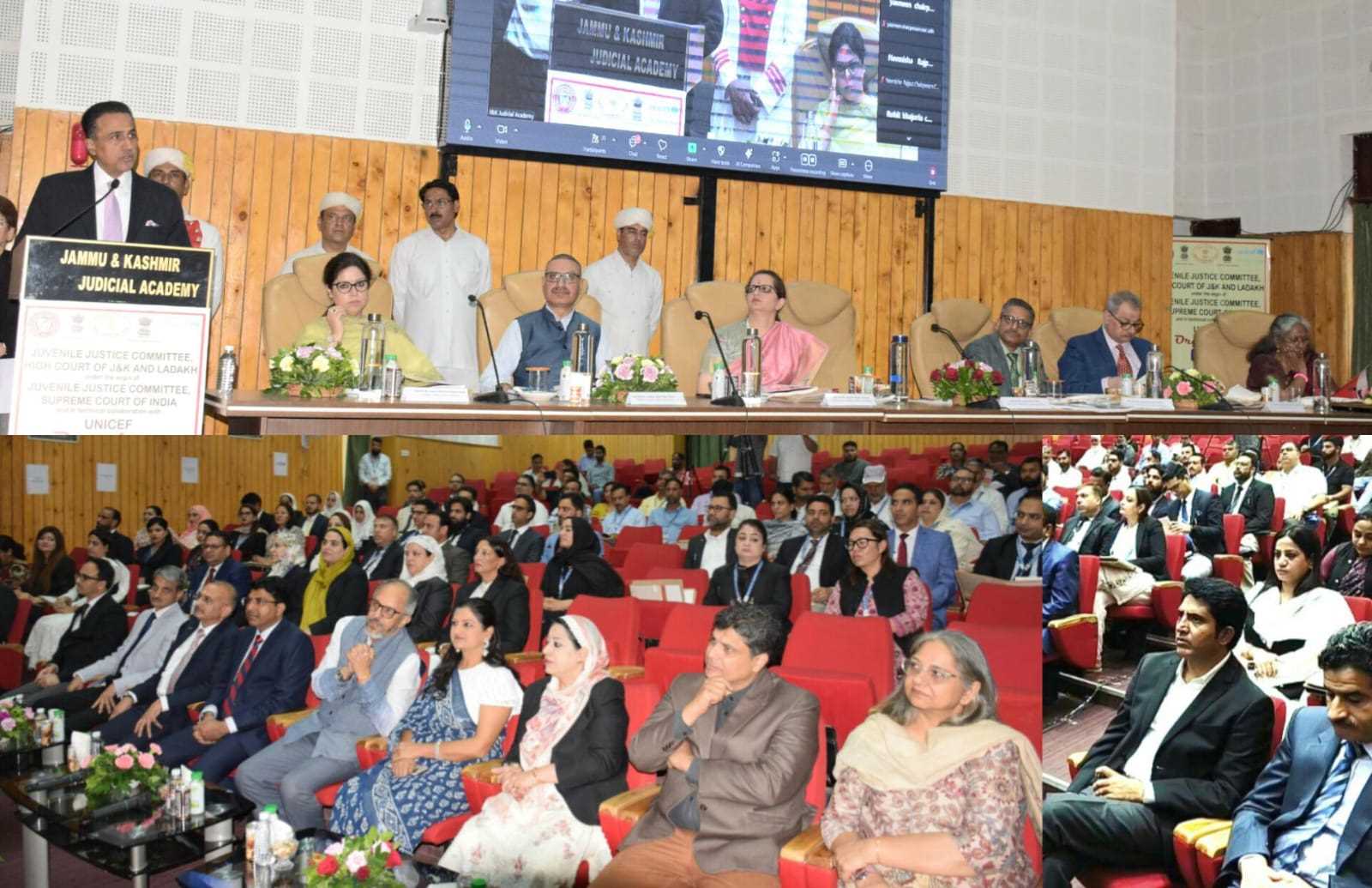
The Juvenile Justice Committee of the High Court of Jammu & Kashmir and Ladakh, in collaboration with UNICEF India, organized a one-day Annual Stakeholders’ Consultation on the theme “Safeguarding the Girl Child: Towards a Safer and Enabling Environment for Her in India” at the Jammu & Kashmir Judicial Academy, Moominabad, Srinagar.
The event was inaugurated by Chief Justice Arun Palli, in the presence of Justices Sindhu Sharma (Chairperson, Juvenile Justice Committee), Rajnesh Oswal, Javed Iqbal Wani, Mohd. Akram Chowdhary, Rahul Bharti, Moksha Khajuria Kazmi, and Shahzad Azeem. Senior officials from the Social Welfare, Health, and Education departments also attended the inaugural session.
Opening remarks invoked the timeless Sanskrit maxim: “Where women are honoured, divinity prevails,” emphasizing that protecting the girl child is not only a legal duty but a sacred societal obligation.
Justice Moksha Khajuria Kazmi underlined the importance of translating legal protections into real-world impact, especially for vulnerable children. Justice Javed Iqbal Wani pointed to alarming issues like declining child sex ratios and called for a multi-pronged response involving legal, economic, and societal action.
Justice Mohd Akram Chowdhary stressed the moral obligation of society to ensure the safety and dignity of girls. UNICEF’s Child Protection Specialist, Vijay Lakshmi Arora, noted that Jammu & Kashmir has shown progress, with improving sex ratios at birth and a decline in child marriage and mortality rates.
Delivering the keynote address, Justice Sindhu Sharma highlighted the paradox of the girl child’s symbolic strength amid continued vulnerability. She called for collective responsibility to ensure that protections translate into empowerment.
In his presidential address, Chief Justice Arun Palli emphasized the need to go beyond safeguarding and work towards full empowerment of the girl child, stressing societal transformation alongside legal safeguards.
The day featured four technical sessions:
Legislations & Schemes – Reviewed laws and government programs targeting the girl child.
Gender Equity through Education & Skills – Focused on reforms in education, vocational training, and digital literacy.
Access to Justice & Community Support – Explored legal aid, child-friendly policing, and NGO collaboration.
Gender-Based Health Inequities – Discussed reproductive health, adolescent mental health, and nutrition.
The valedictory session, chaired by Justice Sindhu Sharma, included remarks from Sonia Gupta, Member Secretary of the Juvenile Justice Committee, who urged continued collective efforts. Hilal Ahmad Bhat (UNICEF) summarized the action points and presented the draft Action Plan 2025–26.
The consultation saw widespread virtual participation from departments across Jammu & Kashmir and Ladakh and reaffirmed the High Court’s commitment to strengthening child protection systems and ensuring justice, dignity, and opportunity for every girl child.
The Juvenile Justice Committee of the High Court of Jammu & Kashmir and Ladakh, in collaboration with UNICEF India, organized a one-day Annual Stakeholders’ Consultation on the theme “Safeguarding the Girl Child: Towards a Safer and Enabling Environment for Her in India” at the Jammu & Kashmir Judicial Academy, Moominabad, Srinagar.
The event was inaugurated by Chief Justice Arun Palli, in the presence of Justices Sindhu Sharma (Chairperson, Juvenile Justice Committee), Rajnesh Oswal, Javed Iqbal Wani, Mohd. Akram Chowdhary, Rahul Bharti, Moksha Khajuria Kazmi, and Shahzad Azeem. Senior officials from the Social Welfare, Health, and Education departments also attended the inaugural session.
Opening remarks invoked the timeless Sanskrit maxim: “Where women are honoured, divinity prevails,” emphasizing that protecting the girl child is not only a legal duty but a sacred societal obligation.
Justice Moksha Khajuria Kazmi underlined the importance of translating legal protections into real-world impact, especially for vulnerable children. Justice Javed Iqbal Wani pointed to alarming issues like declining child sex ratios and called for a multi-pronged response involving legal, economic, and societal action.
Justice Mohd Akram Chowdhary stressed the moral obligation of society to ensure the safety and dignity of girls. UNICEF’s Child Protection Specialist, Vijay Lakshmi Arora, noted that Jammu & Kashmir has shown progress, with improving sex ratios at birth and a decline in child marriage and mortality rates.
Delivering the keynote address, Justice Sindhu Sharma highlighted the paradox of the girl child’s symbolic strength amid continued vulnerability. She called for collective responsibility to ensure that protections translate into empowerment.
In his presidential address, Chief Justice Arun Palli emphasized the need to go beyond safeguarding and work towards full empowerment of the girl child, stressing societal transformation alongside legal safeguards.
The day featured four technical sessions:
Legislations & Schemes – Reviewed laws and government programs targeting the girl child.
Gender Equity through Education & Skills – Focused on reforms in education, vocational training, and digital literacy.
Access to Justice & Community Support – Explored legal aid, child-friendly policing, and NGO collaboration.
Gender-Based Health Inequities – Discussed reproductive health, adolescent mental health, and nutrition.
The valedictory session, chaired by Justice Sindhu Sharma, included remarks from Sonia Gupta, Member Secretary of the Juvenile Justice Committee, who urged continued collective efforts. Hilal Ahmad Bhat (UNICEF) summarized the action points and presented the draft Action Plan 2025–26.
The consultation saw widespread virtual participation from departments across Jammu & Kashmir and Ladakh and reaffirmed the High Court’s commitment to strengthening child protection systems and ensuring justice, dignity, and opportunity for every girl child.
© Copyright 2023 brighterkashmir.com All Rights Reserved. Quantum Technologies